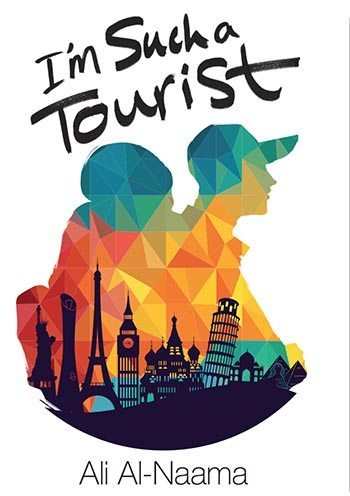By Ali Al-Naama
 I’m Such a Tourist takes a comprehensive look into the $7 trillion food tourism industry and the more than one billion people to whom it caters. Providing insight into what makes a good tourist and how to make a tourism business thrive, the book invites the reader on a journey through time and space that begins with the first travelers and ends in a future full of countless possibilities for the globetrotting excursionist.
I’m Such a Tourist takes a comprehensive look into the $7 trillion food tourism industry and the more than one billion people to whom it caters. Providing insight into what makes a good tourist and how to make a tourism business thrive, the book invites the reader on a journey through time and space that begins with the first travelers and ends in a future full of countless possibilities for the globetrotting excursionist.
The book examines all aspects of the industry, from what makes a tourist to eye-popping, behind-the-scenes looks at what really goes on in an industry that employs almost one in ten of all jobs worldwide.
From tourism’s most primitive beginnings during the Age of Exploration to cable TV channels, Internet websites, Hollywood theme parks and the mega cruise ships of today’s modern era and the outer reaches of space in the future, I’m Such a Tourist is a tribute to the most unique industry in the world. Equal parts history lesson, memoir, and business text, this book will make you rethink the world around you.
Excerpt from the book:
The Future of Food Tourism
Although food tourism may sound like merely the action of tourists eating while traveling, it reaches into a hugely positive effect on our natural-resource supply and the tourism industry as a whole. Food tourism is quite simply the exploration of food as the purpose of travel. Food already ranks with climate, accommodation, and environment as being important to tourists.
Food tourists are attracted often to the locally grown produce of a destination, which they see as deeply connecting them to the origins of a destination. Each destination becomes unique because of its offerings, which are appealing to the tourists who want to become part of the local community.
Tourists today are seeking travel experiences based on local culture and identity, which revolve highly around food. A newer form of tourism, it is spreading widely across the globe as the food industry continues to explode through more and more restaurants and a growing industry of chefs and other careers.
Where is Food Tourism Headed?
But where is food tourism headed? Due to the changes in the accessibility of organic food and the high trafficking of food across continents, food tourism is being forced in a different direction. The pursuit of local food to its source is fighting against what another part of the food movement is trying to accomplish.
In order to prepare the perfect plate or unique menu, professional and personal chefs and restaurateurs are importing raw ingredients that must travel hundreds and thousands of miles by land, air, or water across continents for the mere purpose of a single dish. With these unique products available with ease, food markets and grocery stores are partaking in this retrieval of food unique to distant locations in order to please their consumers.
This trafficking of food across the globe is leaving a heavy carbon footprint, using up important, and limited, natural resources. This threatens the idea of food tourism and depletes natural resources quicker necessary to growing food. Another threat to food tourism is food waste. People in the gourmet food business who are determined to create the perfect menu or meal are not only importing local food from far-off destinations, but are wasting perfectly edible portions of produce, meat, and fish for presentation purposes. This is a widespread habit of those who are not directly affected by hunger.
There are people who counter these chefs and businesses and go the extra mile to use only locally available food and repurpose every part of their food for consumption. The question is which foodie class weighs heavier than the other: the one that is depleting the natural food of the future at an accelerated rate for momentary pleasures or the group that understands sustainability and its important future? The tourism industry must take both into consideration for the future because they each leave their own mark on the environment.
Either way, food tourism is evolving and is predicted to continue changing into the future. There are multiple possibilities for how it will end up depending on the popularity of people living sustainable lifestyles versus that of those contributing to a faster depletion of natural resources. If the scale tips towards the part of humankind that is environmentally aware, then the future of tourism will lean toward one future. And if the depletion of natural resources happens faster than anticipated, then a complete collapse is more likely.
Science, Not Just Humans
 Besides man, science will be a determinant of the future of food tourism. There is the possibility that food tourism will continue to seek out food grown naturally from the Earth at every destination. But the parallel future may be an elevated version of today’s obsession with master chefs with artificially created cuisines.
Besides man, science will be a determinant of the future of food tourism. There is the possibility that food tourism will continue to seek out food grown naturally from the Earth at every destination. But the parallel future may be an elevated version of today’s obsession with master chefs with artificially created cuisines.
Scientists have been creating synthetic food for mankind in preparation as a solution for possible future food shortages. Unlike genetically modified organisms (GMO) that splice in traits from other species to create the food we see on the shelves of markets today, synthetic biology involves the creation of new organisms in a lab with their own full DNA.
The technology used to do this is closely guarded to prevent an adverse reaction from the public of anxiety and distrust. But in order for the planet, and food tourism, to flourish in the future, all possible outcomes must be explored and prepared. If synthetic food is the future, food tourism may focus more on the technology used to create these foods and the unique outcomes it might explore.
Some may scour the planet still in search of natural food, as it becomes a rare and much-desired delicacy. In fact, the pursuit of organic, natural food for tourism purposes may become reserved for the wealthy class and unattainable to the rest of the world. But just because synthetic food is undesirable to the world today, the burden of predicting the future of how to feed the world in the face of depleted resources has been taken up responsibly by scientists through extensive, and reliable, scenario planning.
Ali Al-Naama studied Business in International Tourism Management and found tourism vastly different from what people presume the industry is. During his undergraduate career, he worked in an emerging hospitality company in Qatar, which gave further in-depth experience in hospitality. After graduation, he began working in business development for a company that develops special economic zones. He is now beginning his post-graduate education in Tourism Administration at The George Washington University in the U.S. Visit Al-Naama’s website.
- The Wild Mississippi: 2340 Miles Across Ten States - April 8, 2024
- Exploring the Floating Villages of Tonle’ Sap Lake - April 3, 2024
- Woman Traveling Solo on Turkish Buses - March 27, 2024


